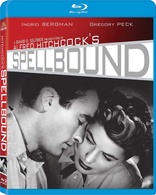Spellbound Blu-ray Movie
HomeSpellbound Blu-ray Movie 
Metro-Goldwyn-Mayer | 1945 | 118 min | Not rated | Jan 24, 2012Movie rating
7.5 | / 10 |
Blu-ray rating
| Users | 4.1 | |
| Reviewer | 3.5 | |
| Overall | 3.6 |
Overview
Spellbound (1945)
A psychiatrist tries to help the man she loves solve a murder buried in his subconscious.
Starring: Ingrid Bergman, Gregory Peck, Michael Chekhov, Leo G. Carroll, Rhonda FlemingDirector: Alfred Hitchcock
| Romance | Uncertain |
| Film-Noir | Uncertain |
| Psychological thriller | Uncertain |
| Mystery | Uncertain |
| Melodrama | Uncertain |
| Thriller | Uncertain |
Specifications
Video
Video codec: MPEG-4 AVC
Video resolution: 1080p
Aspect ratio: 1.37:1
Original aspect ratio: 1.37:1
Audio
English: DTS-HD Master Audio 2.0 Mono (48kHz, 24-bit)
Mono is dual-encoded
Subtitles
English SDH
Discs
50GB Blu-ray Disc
Single disc (1 BD)
Playback
Region free
Review
Rating summary
| Movie | 4.0 | |
| Video | 3.0 | |
| Audio | 3.0 | |
| Extras | 3.0 | |
| Overall | 3.5 |
Spellbound Blu-ray Movie Review
Sometimes parallel lines are just parallel lines.
Reviewed by Jeffrey Kauffman January 13, 2012In the forced collaborative world of Hollywood, bedfellows are strange more often than not, but have there ever been two stranger bedfellows than Alfred Hitchcock and Salvador Dali? Dali was an exuberant poseur who delighted in peeling back the layers of Ego and Id in his art, revealing a morphing, melting world of supercharged imagery that has perhaps unfairly been slathered with the surrealist epithet. Hitch, on the other hand, was a buttoned down, some would say repressed, individual who seemed ill at ease with overt depictions of sexuality and who usually even dealt with images of violence fairly discursively. How did these two ever find common ground to craft several sequences in Hitchock’s paean to psychoanalysis, Spellbound? It’s a long and convoluted story, one which is tangentially if not very explicitly dealt with in both the commentary and one featurette on this new Blu-ray, but the bottom line is both Hitch and Dali did share one salient personality trait with each other: they were both self-promoters non pareil. Hitchcock was one of the very first “star” directors, and he reveled in that rather distinctive role. Dali was of course something of an aging enfant terrible by the late 1940’s, but he had something that David O. Selznick relished in any individual: marquee value. The Selznick team evidently did a market study to find out exactly how much moolah might be brought into Spellbound with the addition of Dali’s name as part of the production team, and the results were somewhat staggering. While Selznick himself may have been less impressed with the actual filmic results than he was with the promise of untold riches being attached to Dali’s name, and there are those to this day who find Spellbound one of the cornier films of Hitch’s Selznick period, there’s no denying that the film has a weird hallucinatory power, one that can’t be separated from Dali’s inimitable touch. Hitch and Dali may indeed have been strange bedfellows, but Spellbound, bastard child that it may well be, is still unique in Hitchcock’s oeuvre, though it plies many of the same trades that Hitchcock works in many, if not most, of his other films, including an “innocent” bystander swept up in events beyond his (or her) control, a subtext of paranoia, and, of course, that simmering sexuality that Hitchcock seemed genetically incapable of letting burst free.
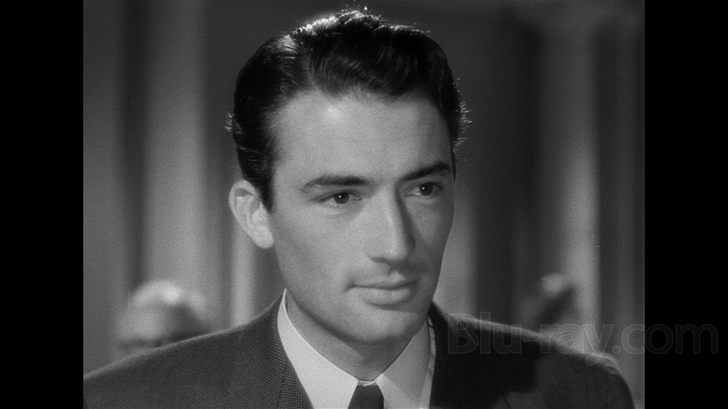
The mid to late 1940’s saw any number of films which either had an outright psychiatric or psychoanalytical tack (Spellbound, The Snake Pit) or at least tangentially alluded to emotional problems (The Best Years of Our Lives). (It may merely be a coincidence, but this onslaught of psychiatrically focused films followed rather quickly on the headlines surrounding the breakdown and institutionalization of Frances Farmer). Spellbound is (rightly or wrongly) seen as the first mainstream film to feature psychoanalysis as a major plot point, and the fact is, what might have seemed groundbreaking and innovative in 1945 may strike modern day audiences as incredibly contrived and over simplified. Ingrid Bergman plays tamped down Dr. Constance Petersen, who works at the sort of tony private institution that only exists in movies, in this case a Vermont refuge known as Green Manors. The institution’s director (Leo G. Carroll) is on his way out the door and new director, one Anthony Edwardes (Gregory Peck) is due to arrive soon to take over. When Edwardes does show up, it’s pretty much love at first sight between him and Constance (one of the film’s most talked about sequences—and one which drew catcalls of derisive laughter when I saw Spellbound at a revival house years ago—has the two kissing over which a superimposed series of doorways opens, an obvious sexual metaphor for Constance letting down her guard). The plot soon thickens (you expected anything less from a Hitchcock film?) when Constance soon realizes that the man who is claiming to be Anthony Edwardes is in fact not Edwardes, and, even worse, he may be a dangerous killer.
Peck’s character, who is suffering from amnesia but who soon remembers his first name is John and his initials are J.B., is haunted by a series of phobias and nervous reactions which seem to stem from seeing parallel lines. That of course piques Constance’s interest, but J.B. decides he is dangerous and takes off in the middle of the night for New York in an attempt to figure out who he really is. In the meantime, the hospital becomes aware that he wasn’t Dr. Edwardes, and there is some suspicion he may actually be involved in the disappearance of the real Dr. Edwardes. Need it be said that Constance chases after John, ultimately secreting him away to the home of her psychoanalyst mentor, who hopefully can help to unravel the demons haunting John’s mind, which are keeping him from bringing up some dreaded memory from his subconscious.
That in turns sets up what is inarguably Spellbound’s best remembered sequences, a couple of short snippets where John remembers a dream he’s been having. The dream sequences were designed by Dali, and they are filled to the brim with odd imagery, imagery which is in fact incredibly haunting and especially unusual for a mid-forties mainstream film. What counteracts the effect of this alarming imagery (some of which undoubtedly mirrors Dali’s iconic work with Bunuel, Un Chien Andalou) is the cut and dried, completely pat “analysis” that is provided for the dream’s imagery, an analysis that is so unbearably literal that even those with little or no grounding in Freudian theory will probably be rolling their eyes about.
Spellbound will probably strike a lot of younger viewers as somewhat predictable and just as probably corny, at least at times, but it still bears the unmistakable imprint of Hitchcock’s mastery. There are a number of standout moments in the film, including some “little” moments like John sleepwalking with an open razor, moving with apparent menace toward Constance’s elderly psychoanalyst mentor. It’s in fact in this “is he or isn’t he?” subtext with regard to John’s character and his perhaps murderous tendencies that the film really provides some chills, probably more so than in the kind of trite (though inarguably compelling) mystery at the heart of the film. But the film is visually quite striking, and not just in the Dali sequences. This is one of the most elegantly lit of all of Hitch’s 1940’s pieces, one which plays with light and shadow in much the same way that Ben Hecht’s screenplay attempts to divine the lights and shadows inside John’s tormented soul.
Spellbound Blu-ray Movie, Video Quality 
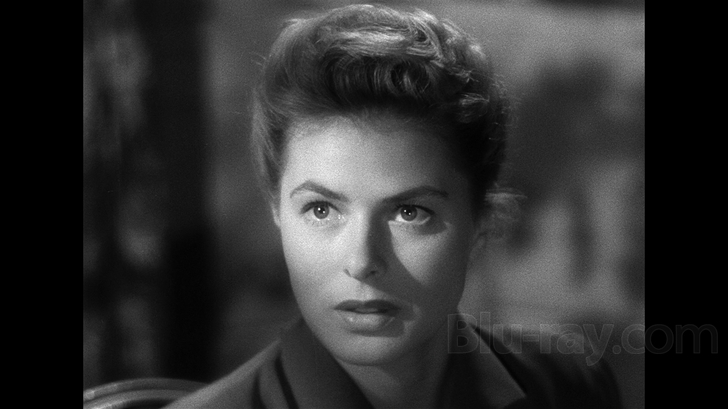
Spellbound is presented on Blu-ray with an AVC encoded 1080p transfer in 1.37:1. David O. Selznick was an
infamous memo writer, and
he is on record as decrying Spellbound as looking like a Monogram Studios shot feature due to its soft, diffuse
quality. With that
understanding, a certain degree of slack must be given to this high definition presentation, for it is indeed overly gauzy a
lot of the time, with a
sort of murkiness in midrange shots that can verge on near blurriness at times. Doing a side by side comparison with the
Criterion DVD release,
and allowing for the obvious resolution differences between the BD and even an upscaled DVD, the Criterion shows
better contrast with much
better black levels, though grain is also somewhat more apparent in the Criterion release than on this transfer. The
MGM-Fox release has a
somewhat milkier appearance, with less delineated gray scale than the Criterion. There really doesn't seem to have
been any DNR, or at least
any overly aggressive DNR, on this MGM-Fox release, as the screencaps obviously show grain (in fact some overwhelming
grain at times which
borders on digital noise). There's also some fairly noticeable haloing due to edge enhancement in several sequences
(check out the screencap
from the dream sequence with the "Proprietor" on the rooftop for a particularly flagrant example). But this BD has a
cleaner, sleeker look than
the Criterion, with noticeably fewer blemishes, scratches and the like
which argues to some sort of digital restoration and cleanup. There's also well above average sharpness and clarity
throughout this
presentation, especially in close-ups. Consumers are always in a quandary with these catalog titles that have also been
licensed by Criterion,
and this probably falls into the same category as a lot of the Universal titles from last year as well as a slew of MGM-Fox
oldies. If it comes to pass, a Criterion
version will no doubt be the go-to release if and when a BD comes down the pike, but for now, this certainly should
suffice, with certain caveats.
It should be noted that this is yet another MGM-Fox catalog release with no Main Menu, and which has been released on
a BD-J but with no bookmarking capability.
Spellbound Blu-ray Movie, Audio Quality 
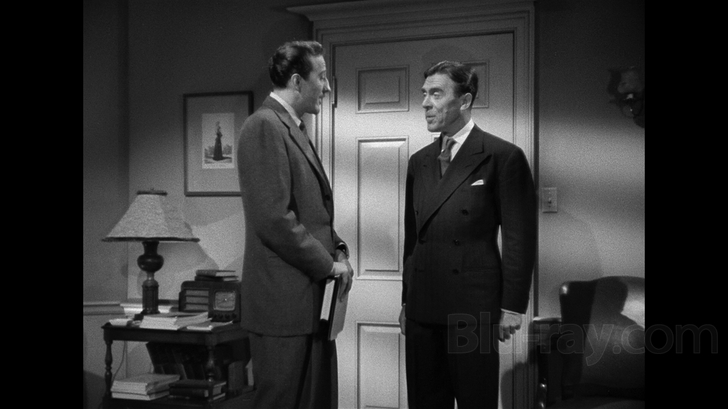
Spellbound's original mono soundtrack is delivered here via a relatively fulsome DTS-HD Master Audio 2.0 mix. Acute listeners will hear some copious hiss blanketing the track's high end from the first moments of the Overture (and how unusual is it for a suspense film like this to feature an Overture?). That propensity continues through the rest of the film, though it's considerably toned down after the Overture. Fidelity is fine, if not amazing, throughout the feature, with excellent reproduction of Miklos Rozsa's incredible score, which was one of the first to utilize the theremin. Dialogue is always well prioritized and easy to hear, and the soundtrack really doesn't exhibit any signs of damage or age, other than the omnipresent hiss and the expected thinness of the sound.
Spellbound Blu-ray Movie, Special Features and Extras 
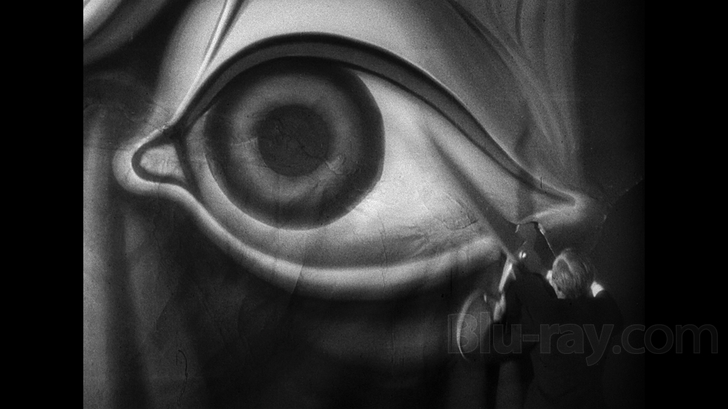
All of the supplements save for the Still Gallery from the Premiere Collection edition of Spellbound on DVD have been ported over to this release:
- Commentary with Film Historians Thomas Schatz and Charles Ramirez Berg. While nowhere near as scholarly as Marian Keane's commentary on the Criterion release of Spellbound, Schatz and Berg, while chatty (and with a tendency to talk over each other, making each a jumble) do impart quite a bit of information on the film's background and production. However, how seriously can you take two guys who question whether Rozsa's score is "too big" for the film, and who also misidentify the film Norman Lloyd falls off the Statue of Liberty in (it's Saboteur, not Sabotage, guys).
- Running With Scissors: Hitchcock, Surrealism and Salvador Dali (SD; 21:25) is an interesting, albeit surface deep, look at this iconic pairing, including information on how it came to be as well as how Selznick deemed the dream sequences unfit for exhibition and had them edited.
- Guilt By Association: Psychoanalyzing Spellbound (SD; 19:39) looks at the film's historic place as the first mainstream film to deal with psychoanalysis, something that may have been in people's minds (no pun intended) as World War II was winding down, and soldiers were coming home in droves who were dealing with emotional problems.
- A Cinderella Story: Rhonda Fleming (SD; 10:10) is a profile of the auburn tressed star.
- 1948 Radio Version of Spellbound Directed by Alfred Hitchcock (59:47) starring The Third Man's Joseph Cotten and Valli.
- Peter Bogdanovich Interviews Alfred Hitchcock (15:22)
- Original Theatrical Trailer (SD; 2:07)
Spellbound Blu-ray Movie, Overall Score and Recommendation 
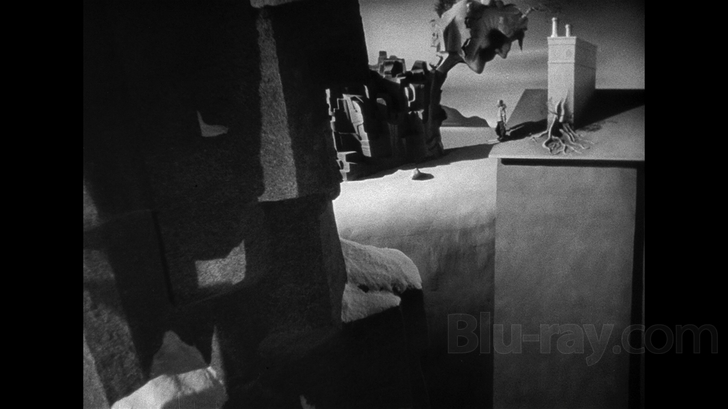
Spellbound has an intriguing mystery at its core that may receive too pat of an explanation as the films careens towards its climax, but viewers have to remember the film's era and how unusual and groundbreaking this subject matter must have seemed back in those days. Elevated inimitably by George Barnes' incredibly evocative proto-noir cinematography and just as much by one of the most glorious (if slightly over the top) Miklos Rozsa scores ever, Spellbound also provides one of the few chances film lovers have to see Dali's input in a mainstream release. The film may indeed be a bit creaky, but it's still immensely enjoyable. This release is probably not going to be the standard bearer if and when Criterion comes along with its own BD, but this release does offer some okay supplements, and boasts acceptable if not stellar video and audio. Recommended.
Similar titles
Similar titles you might also like

Rebecca
1940

Vertigo 4K
1958

Notorious
1946

Laura
Fox Studio Classics
1944

Shadow of a Doubt 4K
1943

In a Lonely Place
1950

Suspicion
Warner Archive Collection
1941

Rope 4K
1948

All Good Things
2010

Rear Window 4K
1954

Fallen Angel
1945

Klute
1971

Marnie 4K
1964

The Crimson Kimono
Limited Edition to 3000
1959

The Big Sleep
Warner Archive Collection
1946

Secret Beyond the Door
4K Restoration
1947

Mildred Pierce 4K
1945

Dial M for Murder 3D
1954

The Black Dahlia
2006

The Third Man
StudioCanal Collection
1949
